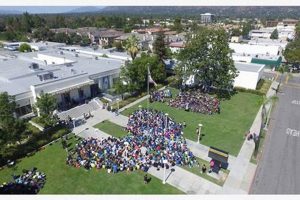Academic performance during the middle school years represents a pivotal stage in a student’s educational journey. This period often marks the transition from foundational learning to more complex subjects and increased academic rigor. A strong performance in middle school can establish a solid base for high school coursework and, consequently, influence college admissions prospects. For example, consistent effort and good study habits developed in these formative years can lead to a smoother transition into the demands of higher-level education.
The significance of this developmental period extends beyond immediate academic success. Middle school provides opportunities for students to explore different subjects, discover their strengths and weaknesses, and cultivate essential skills like time management and organization. Historically, the emphasis on middle school performance has increased as competition for college placements has intensified. A robust academic record, beginning in middle school, can provide a competitive edge in the long term, opening doors to scholarships, advanced placement courses, and a wider range of college options. Cultivating good academic habits at this stage also fosters a sense of responsibility and self-discipline, valuable assets for future success.
This article will delve deeper into the various aspects of academic performance during middle school, examining its impact on future academic and career trajectories, strategies for improvement, and the role of parents and educators in supporting students throughout this crucial phase. Topics covered will include the development of effective study skills, the importance of extracurricular involvement, and navigating the challenges and opportunities presented during this transformative period.
Tips for Academic Success in Middle School
Solid academic foundations laid during middle school are crucial for future educational and career success. These tips offer practical guidance for students navigating this important phase.
Tip 1: Consistent Effort is Key: Consistent effort, even in small increments, yields significant long-term benefits. Regularly reviewing material and dedicating time to homework, rather than cramming before tests, contributes to deeper understanding and retention.
Tip 2: Effective Time Management: Developing strong time management skills is essential. Creating a study schedule, prioritizing tasks, and minimizing distractions can improve focus and productivity.
Tip 3: Active Participation in Class: Active engagement in classroom discussions, asking questions, and contributing to group projects enhances learning and demonstrates intellectual curiosity.
Tip 4: Seek Help When Needed: Understanding when and how to seek help is crucial. Reaching out to teachers, tutors, or classmates for clarification on challenging concepts prevents knowledge gaps from accumulating.
Tip 5: Explore Extracurricular Activities: Participation in extracurricular activities, whether sports, clubs, or volunteer work, promotes well-rounded development, fostering teamwork, leadership, and time management skills.
Tip 6: Cultivate Good Study Habits: Experiment with various study techniques to identify the most effective methods. This might include note-taking strategies, flashcards, or forming study groups.
Tip 7: Maintain Open Communication with Educators and Parents: Regular communication with teachers and parents regarding academic progress and challenges facilitates early intervention and ensures a supportive learning environment.
Tip 8: Focus on Understanding, Not Just Grades: While grades are important, prioritizing a genuine understanding of the material fosters deeper learning and long-term retention. This approach leads to a more meaningful educational experience and prepares students for future academic challenges.
By implementing these strategies, students can establish a strong foundation for future academic success, fostering valuable skills and habits that extend beyond the classroom.
These tips provide a starting point for navigating the academic landscape of middle school. The following section will offer further insights into maximizing potential during these formative years.
1. Foundation for High School
The concept of “foundation for high school” is intrinsically linked to the question of whether middle school grades matter. Middle school serves as the bridge between elementary education and the more demanding academic landscape of high school. The skills, habits, and knowledge acquired during these formative years directly influence a student’s preparedness for the challenges and opportunities that lie ahead. This section explores the multifaceted nature of this foundation and its implications for future academic success.
- Academic Preparedness:
Middle school introduces students to more complex subjects and advanced concepts in core areas like mathematics, science, and language arts. A strong grasp of these fundamentals is essential for tackling the rigorous curriculum of high school. For instance, a student who struggles with algebraic concepts in middle school may face significant difficulties in advanced math courses later on. This highlights the importance of addressing academic weaknesses early to ensure a smooth transition.
- Study Skills and Habits:
Middle school provides a crucial window for developing effective study habits. Learning how to take notes, manage time effectively, and approach different learning styles are skills that become increasingly important in high school. A student who develops these skills early gains a significant advantage in handling the increased workload and academic expectations of higher-level courses. Conversely, poor study habits formed in middle school can create challenges that persist throughout high school.
- Organizational Skills and Self-Discipline:
The increasing independence and responsibility expected in middle school necessitate the development of strong organizational skills and self-discipline. Learning to manage assignments, meet deadlines, and balance extracurricular activities with academics prepares students for the greater autonomy and complex scheduling demands of high school. These skills contribute not only to academic success but also to overall personal development.
- Exposure to Diverse Subjects:
Middle school often offers students their first exposure to a wider range of subjects, including foreign languages, fine arts, and elective courses. This exploration allows students to discover their interests and aptitudes, informing future academic and career choices. Early exposure to these diverse fields can spark passions and provide a head start in areas of interest, enriching the high school experience and beyond.
These facets collectively demonstrate the significant role middle school plays in shaping a student’s preparedness for high school. A strong foundation built during these formative years, encompassing academic proficiency, effective study habits, organizational skills, and exposure to diverse subjects, significantly contributes to future academic success and overall well-being. Therefore, consistent effort and academic engagement in middle school are not merely stepping stones but essential building blocks for a successful high school experience and beyond.
2. Skill Development
Skill development in middle school forms a critical link to the broader question of academic performance during these formative years. The skills acquired during this period extend beyond subject-specific knowledge and encompass crucial abilities essential for both academic success and future life endeavors. This section examines key facets of skill development and their connection to overall achievement.
- Critical Thinking:
Middle school curricula increasingly emphasize critical thinking skills, challenging students to analyze information, evaluate arguments, and form reasoned judgments. Analyzing historical events, interpreting scientific data, or constructing persuasive essays all require critical thinking. These skills become increasingly important in high school and beyond, impacting academic performance and preparing students for informed decision-making in various aspects of life.
- Communication Skills:
Effective communication, both written and oral, is honed during middle school through presentations, essays, and class discussions. Articulating ideas clearly and persuasively, supporting claims with evidence, and engaging in respectful dialogue are essential skills for academic success and future career prospects. The development of these skills in middle school lays the groundwork for effective communication in higher education, professional settings, and interpersonal relationships.
- Problem-Solving Abilities:
Middle school presents students with increasingly complex problems, requiring them to develop effective problem-solving strategies. Whether tackling mathematical equations, designing scientific experiments, or resolving conflicts in group projects, students learn to approach challenges systematically, analyze options, and implement solutions. These problem-solving abilities are valuable assets in academic pursuits, career paths, and everyday life.
- Collaboration and Teamwork:
Group projects and extracurricular activities in middle school provide opportunities to develop collaboration and teamwork skills. Learning to work effectively with others, contribute to shared goals, and navigate diverse perspectives prepares students for the collaborative nature of many academic and professional environments. These experiences foster valuable interpersonal skills and promote a sense of community and shared responsibility.
These interconnected skills contribute significantly to a student’s overall academic performance in middle school and lay the foundation for continued success in high school and beyond. The emphasis on skill development during these formative years underscores the importance of a holistic approach to education, recognizing that academic achievement encompasses not only subject-specific knowledge but also the crucial abilities that empower students to become effective learners, critical thinkers, and successful individuals.
3. Habit Formation
Habit formation during the middle school years plays a crucial role in academic performance and future success. This period presents a unique opportunity to cultivate effective learning strategies, organizational skills, and a disciplined approach to academics. The habits established during these formative years often carry over into high school and beyond, influencing long-term academic trajectories and overall life outcomes. A student who develops the habit of consistent study, for example, is more likely to maintain this practice in high school and college, leading to improved academic performance. Conversely, inconsistent study habits ingrained in middle school can create challenges that persist throughout a student’s educational journey.
The connection between habit formation and academic performance in middle school is multifaceted. Effective time management, for instance, allows students to balance academic demands with extracurricular activities and personal commitments. A student who habitually prioritizes tasks and allocates time efficiently is better equipped to handle the increasing workload and complexity of high school coursework. Similarly, the habit of seeking help when needed, whether from teachers, tutors, or classmates, can prevent knowledge gaps from widening and foster a proactive approach to learning. Students who cultivate this habit are more likely to address academic challenges promptly, leading to improved understanding and performance. Real-life examples abound, demonstrating how students who prioritize organization, consistent effort, and effective communication with educators often achieve greater academic success and experience less stress related to schoolwork.
Understanding the significance of habit formation in middle school provides valuable insights for educators, parents, and students alike. By emphasizing the development of positive academic habits during these formative years, educators can empower students to become more effective learners and achieve their full potential. Parents can reinforce these habits at home by creating supportive learning environments and encouraging consistent routines. Ultimately, the cultivation of strong academic habits in middle school contributes not only to immediate academic success but also to the development of essential life skills that promote long-term personal and professional growth. Addressing challenges related to procrastination, disorganization, or ineffective study strategies early on can significantly impact a student’s future academic trajectory and overall well-being.
4. College Preparation
The relationship between middle school performance and college preparation is often underestimated. While college applications directly consider high school transcripts, the foundation laid during middle school significantly influences later academic success. Consistent effort and strong academic habits cultivated in middle school translate into a smoother transition to the rigors of high school, ultimately contributing to a stronger college application profile. For example, students who develop effective time management and study skills in middle school are better equipped to handle the increased demands of advanced placement courses and extracurricular activities in high school, factors that colleges highly value. Furthermore, a solid academic record in middle school can open doors to advanced placement classes and honors programs in high school, further enhancing college preparedness. This cumulative effect underscores the importance of middle school as a formative stage in the college preparation process.
The importance of college preparation as a component of middle school success extends beyond simply gaining admission. A strong academic foundation built during middle school equips students with the critical thinking, problem-solving, and communication skills essential for thriving in a challenging college environment. Students who consistently engage in analytical thinking and problem-solving during middle school develop a mindset that prepares them for the intellectual rigors of higher education. For instance, a student accustomed to analyzing complex texts in middle school will be better prepared for the demanding reading and writing assignments encountered in college courses. Moreover, developing effective communication skills, both written and oral, through presentations, essays, and class discussions in middle school empowers students to articulate their ideas confidently and effectively in college seminars and presentations. This proactive approach to skill development in middle school pays dividends throughout a student’s academic journey and beyond.
In conclusion, the connection between middle school performance and college preparation is a crucial, albeit often overlooked, aspect of a student’s educational trajectory. Middle school serves as a critical period for developing the academic skills, habits, and mindset necessary for success in high school and, consequently, college. Recognizing the long-term impact of middle school performance empowers educators, parents, and students to prioritize academic engagement and cultivate the essential skills for future academic pursuits. Addressing challenges and fostering a supportive learning environment during these formative years can significantly enhance a student’s prospects for college success and beyond. This understanding underscores the significance of middle school not merely as a stepping stone, but as a foundational stage in a student’s educational journey.
5. Self-Discovery
Self-discovery during middle school plays a crucial role in a student’s overall development and is intrinsically linked to academic performance. This period marks a time of exploration and transition, where students begin to identify their strengths, weaknesses, and interests. This process of self-discovery significantly influences academic motivation, subject selection, and long-term academic goals. Understanding the connection between self-discovery and academic performance in middle school offers valuable insights into how to support students during this formative stage.
- Exploring Academic Strengths and Weaknesses:
Middle school provides a platform for students to explore various academic disciplines, exposing them to a wider range of subjects than in elementary school. This exposure allows them to identify subjects where they excel and areas where they may require additional support. Recognizing these strengths and weaknesses early on allows for targeted interventions, whether it’s seeking extra help in challenging subjects or pursuing advanced opportunities in areas of strength. This process of self-assessment contributes to a more informed and proactive approach to learning, ultimately influencing academic performance.
- Identifying Personal Interests and Passions:
Middle school offers opportunities to explore extracurricular activities, clubs, and elective courses, enabling students to discover their passions and interests outside of core academics. Discovering a passion for music, art, sports, or community service can significantly impact a student’s overall motivation and engagement in school. These interests often complement and enhance academic pursuits, fostering a more well-rounded and fulfilling educational experience. For instance, a student passionate about history might excel in related academic subjects and seek out additional learning opportunities outside the classroom.
- Developing a Sense of Self-Efficacy:
Successfully navigating academic challenges, participating in group projects, and taking on leadership roles in extracurricular activities contribute to a student’s developing sense of self-efficacy. This belief in one’s ability to succeed academically motivates students to persevere through challenges and strive for continuous improvement. A strong sense of self-efficacy can positively influence academic performance and foster a growth mindset, essential for navigating the increasing demands of high school and beyond. Experiences in middle school, whether academic or extracurricular, play a crucial role in shaping this sense of self-belief.
- Shaping Future Academic and Career Paths:
The process of self-discovery in middle school lays the groundwork for future academic and career choices. Exploring different subjects, identifying areas of interest, and recognizing personal strengths and weaknesses inform decisions about high school course selections, extracurricular pursuits, and ultimately, career aspirations. This early exploration allows students to make more informed choices about their future academic and professional trajectories, increasing the likelihood of pursuing paths aligned with their interests and abilities. A student who discovers a passion for science in middle school, for example, might choose to focus on science-related courses in high school and pursue a career in a scientific field.
These interconnected aspects of self-discovery highlight the significant role middle school plays in shaping a student’s overall development. The exploration of academic strengths and weaknesses, the identification of personal interests, the development of self-efficacy, and the early shaping of future academic and career paths collectively contribute to a student’s academic journey and beyond. By fostering a supportive environment that encourages self-discovery, educators and parents can empower students to become more engaged, motivated, and successful learners, prepared to navigate the challenges and opportunities of high school and beyond. Recognizing the importance of self-discovery during these formative years underscores the value of a holistic approach to education, where academic performance is viewed not in isolation, but as an integral part of a student’s overall growth and development. This period of exploration and self-assessment ultimately contributes to a more fulfilling and successful educational experience.
6. Future Opportunities
The impact of middle school performance on future opportunities is a significant factor often overlooked in discussions about the importance of these formative years. While the immediate consequences of grades might seem limited, their influence on subsequent academic and career paths is substantial. Strong academic performance in middle school often creates a ripple effect, opening doors to advanced academic programs, enriching extracurricular activities, and ultimately broadening the range of future opportunities available to students. This connection between middle school success and future prospects is not simply a matter of correlation, but a demonstrable cause-and-effect relationship. For instance, consistent high achievement in middle school mathematics can pave the way for enrollment in advanced mathematics courses in high school, potentially leading to college credit, scholarships, and a head start in STEM-related fields. Similarly, strong performance in middle school English can unlock opportunities for advanced writing and literature courses, cultivating essential skills for future academic and professional success. These early academic achievements become stepping stones, creating a pathway to a wider array of options later on.
The practical significance of understanding this connection is profound. Students who recognize the impact of their middle school performance on future opportunities are more likely to approach their studies with purpose and dedication. This understanding can motivate students to develop strong study habits, seek academic challenges, and cultivate a growth mindset. The availability of advanced placement courses, honors programs, and specialized academic tracks in high school often hinges on middle school performance. These programs, in turn, can significantly influence college admissions prospects and open doors to scholarships and other financial aid opportunities. Furthermore, participation in extracurricular activities, such as academic clubs, debate teams, and student government, is often enhanced by a strong academic foundation. These experiences foster leadership skills, teamwork, and critical thinkingqualities highly valued by colleges and employers alike. Real-life examples abound, demonstrating how consistent effort and achievement in middle school have propelled students toward exceptional opportunities in high school, college, and beyond. These opportunities are not merely abstract concepts but tangible outcomes with lasting impact on a student’s life trajectory.
In summary, the link between middle school performance and future opportunities is a critical aspect of educational development. Recognizing this connection empowers students to approach their middle school years with greater purpose and focus, understanding that their present efforts can significantly shape their future prospects. This understanding fosters a proactive approach to learning, encouraging students to strive for academic excellence and seek out enriching opportunities. By emphasizing the long-term implications of middle school performance, educators and parents can instill a sense of purpose and motivation, equipping students with the tools and mindset to maximize their potential and achieve their long-term goals. This proactive approach, rooted in the understanding of how present actions influence future possibilities, is essential for fostering academic success and preparing students for a fulfilling and impactful future. The challenges and opportunities presented during middle school are not merely isolated events but formative experiences that contribute significantly to a student’s overall life trajectory.
Frequently Asked Questions
This section addresses common queries regarding the significance of academic performance during middle school, providing clear and concise answers to help clarify potential misconceptions and underscore the importance of this pivotal educational phase.
Question 1: How do middle school grades influence high school placement?
Performance in middle school often influences course selection and placement in high school. Strong grades can open doors to advanced placement classes, honors programs, and specialized academic tracks, providing a significant advantage in high school and beyond. Conversely, struggling in middle school might necessitate remedial courses in high school, potentially delaying progress toward graduation requirements.
Question 2: Do colleges look at middle school transcripts?
While colleges primarily evaluate high school transcripts, the foundation built during middle school indirectly impacts high school performance. Strong academic habits and skills developed in middle school translate to better preparedness for high school coursework, ultimately influencing the strength of a college application.
Question 3: What if a student struggles academically in middle school?
Academic struggles in middle school should be addressed proactively. Seeking support from teachers, tutors, or educational professionals can help identify learning challenges and implement effective strategies for improvement. Open communication with parents and educators is crucial for creating a supportive environment conducive to academic growth.
Question 4: Is it too early to think about college in middle school?
While formal college applications are years away, middle school represents a crucial period for developing the foundational skills and habits necessary for future academic success, including college preparedness. A strong academic foundation built in middle school sets the stage for a smoother transition to high school and beyond.
Question 5: How can parents support their children’s academic success in middle school?
Parental involvement plays a key role in supporting academic success. Creating a supportive home environment, encouraging consistent study habits, maintaining open communication with teachers, and providing access to resources like tutoring or educational programs can significantly impact a students performance and motivation.
Question 6: Beyond grades, what other factors contribute to middle school success?
Academic success in middle school encompasses more than just grades. Developing essential skills such as time management, organization, critical thinking, and communication are equally important. Active participation in extracurricular activities, exploring personal interests, and cultivating a positive attitude towards learning contribute to a well-rounded and successful middle school experience.
Consistent effort and a proactive approach to learning during middle school are crucial for future academic and personal success. Addressing challenges early on and cultivating strong academic habits can significantly impact a student’s trajectory throughout high school, college, and beyond.
For further insights and resources on navigating the challenges and opportunities of middle school, please consult the resources provided below.
Does Middle School Grades Matter? A Concluding Perspective
This exploration of middle school academic performance reveals its significant impact on future trajectories. Academic foundations established during these formative years influence high school preparedness, skill development, and the cultivation of essential habits. The exploration of personal interests, strengths, and weaknesses contributes to self-discovery, shaping future academic and career paths. Consistent effort and engagement in middle school create a ripple effect, expanding future opportunities and preparing students for the challenges and opportunities of high school, college, and beyond. The evidence presented underscores the importance of middle school not merely as a transitional phase, but as a crucial period for establishing a strong foundation for lifelong learning and success. This period deserves significant attention and investment from educators, parents, and students alike.
The cumulative impact of academic performance in middle school extends far beyond immediate results. It represents an investment in future potential, shaping not only academic outcomes but also personal growth and future opportunities. A proactive and engaged approach to middle school education equips students with the skills, habits, and mindset necessary for navigating the complexities of higher education and the professional world. The long-term benefits of a strong middle school foundation underscore the importance of fostering a supportive and challenging learning environment during these crucial years. This investment in middle school education yields significant returns, empowering students to reach their full potential and contribute meaningfully to society.







